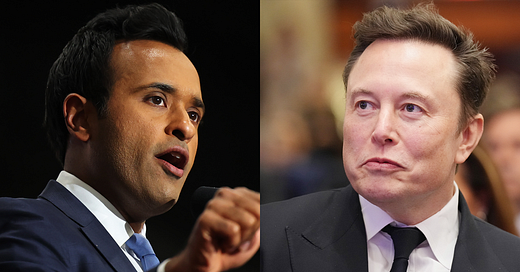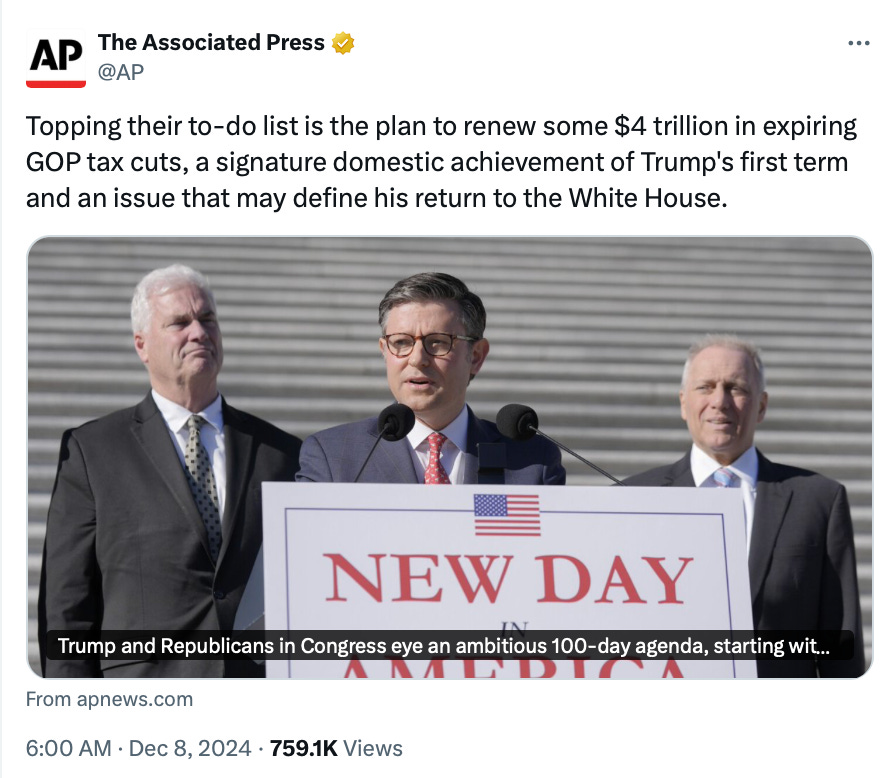Will Trump's 'Department Of Government Efficiency' Actually Accomplish Anything?
As Trump sets Musk and Ramaswamy up for failure, Democrats hope to call DOGE's bluff

On November 12, Donald Trump announced on Truth Social that he would appoint Elon Musk and Vivek Ramaswamy to head up the so-called Department of Government Efficiency (DOGE), with the mission to:
“Dismantle Government Bureaucracy, slash excess regulations, cut wasteful expenditures, and restructure Federal Agencies.”
This was met with instant mockery for several reasons, not the least of which was that appointing two people to fill one position is the literal definition of inefficiency.
Then there was the meme-ness of it all, with “DOGE” taking the name—and mascot—from the meme-inspired Dogecoin, a cryptocurrency supported by Musk.
Musk seems to have set the whole effort up for failure by pledging that DOGE would cut “at least $2 trillion” from the U.S. budget. “Your money is being wasted,” Musk declared at Trump’s October Madison Square Garden rally, “and the Department of Government Efficiency is going to fix that!”
A couple of problems with that. First, as the BBC notes, the entire budget of the U.S. government in the past fiscal year was $6.75 trillion, with just $1.7 trillion of discretionary spending, meaning that to hit his $2 trillion goal, Musk would have to dip into Social Security and Medicare. Even Trump understands any “mandate” he might have going into 2025 does not include undermining these vastly popular safety net programs.
But the other big question here is how Musk and Ramaswamy can possibly accomplish any actual government cuts when they won’t have any statutory enforcement capability. As Trump made clear in his post announcing the effort:
“The Department of Government Efficiency will provide advice and guidance from outside of Government.”
That’s right, this so-called “Department” won’t be a department at all, it will work “outside of government.” It can advise, it can recommend, it can lobby, but ultimately it will have no real power, just the hope that they can convince members of Congress to actually do the cutting.
Which is probably why, despite the characteristically over-the-top language Trump used to announce DOGE, and despite Musk’s bonkers over-promising of its cutting capacity, Musk and Ramaswamy are comically evasive about what they will actually end up doing in their roles at DOGE.
As Yahoo Finance put it:
“Elon Musk’s DOGE benefits from being whatever people want it to be”
Yes, the so-called Department of Government Efficiency is more a branded facade than anything substantive, which is a bit on the nose for Trump.
But what do we actually know about what this quasi-department will look like once Trump takes office in just over a month? In today’s piece, I’ll break down what has been reported about DOGE so far and take a look at how both Republicans and Democrats are responding to the planned effort, including some surprising allies on the Democratic side.
What We Know About DOGE So Far
The shadowy nature of DOGE appears to sort of be the point, but there are some things we can glean from the reporting.
According to CBS News, DOGE would likely operate under the “Federal Advisory Committee Act, which dictates how external groups that advise the government must operate and be accountable to the public.” By organizing it this way, Musk and Ramaswamy won’t have to go through the usual federal employee disclosure process, which likely would have been a non-starter, particularly for Musk. His own conflicts of interest are numerous, as he stands to benefit greatly from a second Trump term, particularly if he’s helping direct funding priorities.
And while DOGE won’t have any real power to cut anything, it will have a House sub-committee devoted to working with the group to presumably identify potential spending cuts. Rep. James Comer, Chair of the House Oversight Committee, announced the formation of the “Delivering On Government Efficiency (DOGE) Subcommittee”—see what he did there?
The subcommittee will be chaired by none other than Rep. Marjorie Taylor Greene. Because, of course.
As Rep. Jamie Raskin put it in a statement:
"So now a noted student of American government, Rep. Marjorie Taylor Greene, will chair a subcommittee to work with two unvetted billionaires who stand to receive billions more in government contracts and subsidies from the government under Trump.”
There is also a House DOGE caucus, whose chair Rep. Aaron Bean of Florida has launched a tip line for public input: doge@mail.house.gov. There is a Senate DOGE caucus as well, which is led by Senator Joni Ernst, whose first report identifying government funding cut opportunities appears to be cracking down on federal employees who telework and unused federal government office space. That seems like pretty small potatoes for an initiative with such high aspirations.
Adding to the suspicion that DOGE is mostly bark and not much bite is that it has been conceived from the start as temporary, with a distinct expiration date, putting its lifespan at around a year and a half.
This is a tacit acknowledgment that Team Trump is well aware that Republicans are likely to lose the House in 2026, at which point this charade goes away. So, better to pull the plug preemptively themselves.
Musk and Ramaswamy were hailed by Republicans during their visit to Capitol Hill last week, but even for ideologically aligned Congressional Republicans, according to NBC News, Musk’s stated ambitions are “a tough sell”:
While Musk and Ramaswamy went from meeting to meeting, Republicans close to the government funding process, like House Appropriations Committee member Rep. Steve Womack, Ark., said that while some cuts were possible, the $2 trillion that Musk talks about would likely be a bridge too far.
“If you’re going to leave the social safety net programs alone and not touch them, that means you’re going to try to cut hundreds of billions of dollars out of discretionary spending” if you want to achieve massive, DOGE-style reductions, he told CNBC in an interview.
“It would be very difficult to do that without cutting national security,” said Womack.
According to Punchbowl News, not even Speaker Johnson has any “idea how Congress will process any spending cuts that DOGE suggests.” And when asked if cuts to the Pentagon were a possible target, he would not “say now what’s on or off … the table.”
And as a top Republican aide described the spectacle—anonymously, of course—to Punchbowl:
“Two people who know nothing about how the government works pretending they can cut a trillion dollars, both with decent pulpits to preach from, and the ear of an unpredictable president? Disaster. The only good thing is that at some point they’ll overpromise and get bounced by Trump. But until then … disaster.”
Democratic Rep. Maxwell Frost put it perfectly on MSNBC recently when he said:
“It’s a joke. We’re talking about two billionaires who are cosplaying as government officials, not an actual department of the government. It’s an X account right now.”
He went on:
“I’m all for making our government more efficient, but we have to look at the proposition here. The proposition of these two guys is that to make the government more efficient we gotta fire a bunch of people and take away a bunch of funding. And that lack of nuance and actually providing real oversight on how we can make the government work in a better way shows me firsthand that they are not coming at this on the right foot and not coming at it from the right place.”
What Trump, Musk, And Ramaswamy Actually Mean By “Cutting Waste”
As Frost rightly notes, as of now, DOGE is just an X account, and that account can give us a glimpse into what spending they are willing to put on blast publicly.
The posts there range from complaints about large IT budgets to maintain outdated systems, the National Institutes of Health budget, wasted federal office space, and even, somewhat surprisingly, the Pentagon.
As the law firm Gibson Dunn has laid out, their targets will include many longstanding conservative bugaboos :
Musk, Ramaswamy, and the DOGE X account have identified a number of targets for spending reductions. These include several specific appropriations or federal grants that they consider to be wasteful, such as appropriations for NGOs, DEI training programs, PBS, NPR, $300 million in funding to Planned Parenthood and related organizations, and $1.5 billion in grants to international organizations.[44]
As well as Biden-era expenditures:
Ramaswamy has also asserted that DOGE will closely review CHIPS Act contracts, especially those the Biden administration accelerated ahead of the transition.[47]
And appropriations with expired authorizations:
The Congressional Budget Office has identified $516 billion in appropriations for 2024 associated with 491 expired authorizations of appropriations across a range of agencies, including a number of appropriations administered by the Department of Veterans Affairs, State Department, Department of Education, National Institutes of Health, Federal Aviation Administration, NASA, and more.[49]
But we know Trump’s ultimate goal here is not simply to save nickels and dimes from the budget, which we know he doesn’t actually care about. It’s a way to try to follow through on his promise to rip apart the so-called “Administrative State.” This involves a mass firing of the dreaded “unelected bureaucrats” of the federal government.
According to Forbes:
Ramaswamy called for a “massive downsizing,” while Musk backed a roughly 75% reduction in the amount of U.S. federal agencies,” though any widesweeping funding changes would need to get approval from Congress.
In an appearance on the “Joe Rogan Experience” podcast, Musk said he hopes to “curtail [government] agencies to be much smaller” and to only “stick to what Congress authorized,” also calling for massive severance packages for government employees impacted by a potential purge (“a couple years of pay”)
Additionally:
Musk also intends to pare down the Federal Trade Commission, IRS, Justice Department and Securities and Exchange Commission, reported The Wall Street Journal, citing two unnamed sources who have discussed the plans with Musk.
Such governmental downsizing will come up against legal challenges, particularly when it comes to civil service employee protections against at will firing, which President Biden bolstered in April with a new regulation. Biden revoked Trump’s Schedule F executive order, which was designed to “make it easier for government leaders to fire federal employees,” and Trump has pledged to reinstate it. Biden’s new rule is expected to make Trump’s attempt to decimate the federal workforce more difficult but may not mitigate it entirely.
To get around these pesky legal obstacles, Ramaswamy introduced a twisted “thought experiment” for how to reduce the federal employee workforce by 75% almost immediately.
“In there on Day 1, anybody in the federal bureaucracy who's not elected, whose social security number ends in an odd number, you're out, if it ends in an even number, you are in. There’s a 50 per cent cut right there. Of those who remain, if your social security number starts in an even number, you're in, and if it starts with an odd number, you're out. That's a 75 per cent reduction."
“One of the virtues of that…it is a thought experiment, not a policy prescription…is that you don’t have a bunch of lawsuits dealing with gender or racial discrimination or political viewpoint discrimination. I guarantee you, do that on Day 1 and step two on Day 2. On Day 3, not a thing would have changed for the ordinary American, other than that their government being a lot smaller, spending a lot less money to operate it.”
Other than, you know, the mass unemployment such a move would create and the general paralysis of the government. But sure.
Trump has also made clear he wants to end the Department of Education, a goal that has been endorsed by Musk and Ramaswamy, but that is virtually DOA as it would require congressional approval.
But perhaps these obstacles are part of the point. Because for Trump, it’s actually not in his interest to get rid of the “deep state” at all since it serves as a convenient scapegoat to take the fall for when Trump fails to accomplish anything over the next two years despite controlling all branches of government, just as he did from 2017-2019.
In short, for Trump DOGE is more about getting credit for trying to cut government spending than it is about actually making serious cuts.
How Democrats Are Calling DOGE’s Bluff
The notion that Trump, or any Republican for that matter, cares about cutting costs is absurd, of course. We know Republicans are far more responsible for growing deficits than Democrats are, as Alex Cole’s viral 2019 tweet, which was endorsed by Politifact, made clear:
And looking at Donald Trump’s record specifically, during his first term in office, he increased the national debt by 39% to $28 trillion. Even before the emergency deficit spending to mitigate the disastrous effects of the Covid pandemic, per ProPublica:
The combination of Trump’s 2017 tax cut and the lack of any serious spending restraint helped both the deficit and the debt soar.
And yes, that was while Trump had a Republican House and Senate.
As ProPublica recalls those first few years of Trump’s first term:
After he took office, Trump predicted that economic growth created by the 2017 tax cut, combined with the proceeds from the tariffs he imposed on a wide range of goods from numerous countries, would help eliminate the budget deficit and let the U.S. begin to pay down its debt. On July 27, 2018, he told Sean Hannity of Fox News: “We have $21 trillion in debt. When this [the 2017 tax cut] really kicks in, we’ll start paying off that debt like it’s water.”
Nine days later, he tweeted, “Because of Tariffs we will be able to start paying down large amounts of the $21 trillion in debt that has been accumulated, much by the Obama Administration.”
That’s not how it played out. When Trump took office in January 2017, the nonpartisan Congressional Budget Office was projecting that federal budget deficits would be 2% to 3% of our gross domestic product during Trump’s term. Instead, the deficit reached nearly 4% of gross domestic product in 2018 and 4.6% in 2019.
And so now what is on the agenda for Trump’s second term? Re-upping his tax cuts set to expire in 2025 is top of the list for Republicans in Trump’s first 100 days.
And as The AP notes:
The Congressional Budget Office estimates that keeping the expiring provisions in place would add some $4 trillion to deficits over a decade.
Adding to that, Trump wants to include his own priorities in the tax package, including lowering the corporate rate, now at 21% from the 2017 law, to 15%, and doing away with individual taxes on tips and overtime pay.
Add to that Trump’s promised tariffs redux and Trump is set to preside over yet another soaring debt and deficit. That helps explain why he is working overtime to build an empty vessel cost-cutting brand like DOGE.
Knowing all of this, Democrats are refusing to sit back and cede this entire notion of government efficiency to big spending Republicans. In fact, many of them want in, such as Rep. Jared Moskowitz, who became the first Democrat to join the DOGE caucus in the House.
As he told NPR:
Look, I don't know any American who thinks the government is perfect. If there are people with legitimate suggestions on how we can improve government efficiency, bring technology to government, or figure out where there's waste and fraud to save taxpayer dollars, we should do that. It shouldn't be a partisan issue.
Similarly, Democratic Governor Jared Polis of Colorado is urging Musk and Ramaswamy to take a look at the savings that can be accrued by eliminating the penny, a pet project of many members of Congress for years:
Others are approaching it from a more progressive perspective, seeing DOGE as an opportunity to challenge Republicans to put their money where their mouths are when it comes to the waste in the Defense Department.
Take Bernie Sanders, who famously ruffled feathers recently by asserting “Elon Musk is right” in a post on X calling on DOGE to cut the Pentagon budget.
Likewise, Rep. Ro Khanna, a member of the Congressional Progressive Caucus who represents Silicon Valley in the House, wants to end government subsidies for defense contractors and is urging Democrats to work with Musk.
While many of these members’ left-leaning constituents are upset by their palling around with Trump and his minions, some see this as smart politics.
For one thing, it helps to undermine Republicans’ attempts to brand themselves as the party of cost-cutters. Additionally, there is no downside for Democrats to call DOGE’s bluff here: If it works then they have successfully reached across the aisle to get spending cuts done that many on the left have been trying to secure for decades.
But more likely, when DOGE doesn’t take up the calls from Democrats to cut wasteful Defense spending, the Democrats can run against Congressional Republicans as ineffective in 2026.













Well, if they're going to cut government waste and inefficiency, why not cut all of Elon Musk's government contracts?
I'm so utterly embarrassed to be American right now.